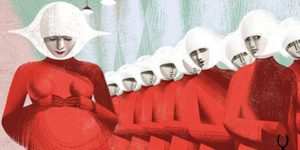Whether it’s on a word processor, a napkin, tattooed on my body, a piece of lined paper…the same question always seems to get asked when a piece of my craft is finished:
Does this suck?
I know that every poet has a voice. I know that art is beyond subjective. I know that poetry is never truly finished until the poet is dead (and that’s debatable). I know revision doesn’t die. I know, I know, I know. Even so, it still seems as if I can never gage what is good and what isn’t. It reminds me of looking at a newborn baby…you know it’s supposed to be cute, because it’s a baaaaaaby, but it’s just so darn ugly and wrinkly and it looks like a Christmas ham or an alien or something. Even so, the parents are so damn proud of their bundle of joy, a piece of themselves, that is now in their arms.
I don’t want to be cynical and call my own baby ugly, but I don’t want to be overly proud of something that isn’t very good. I find that I can’t tell whether I’m too proud or too insecure about my work: am I an egoist? Am I my own worst critic? Am I even a poet? Why am I doing this? What am I doing this for?
All by looking at a series of words, lines, white space…who gets to decide what is good? I think that the beauty of craft is that we’re all just at the mercy of our own poems. Sometimes I write something and it feels like it wrote itself. How did this even happen? How did one thing turn into something else? It reminds me of the Spicer interview when he talked about poetry being a sort of parasite. I think the parasitic nature of poetry (if you’re willing to subscribe to that) makes for a loss of control that maybe leads to a loss of knowing the goodness and validity of a poem.
Just conjecture. I’m sorry this post is all over the place. Does this suck?
It’s never ending.

